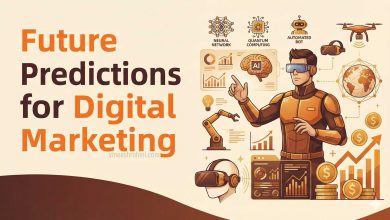Predicting the Future of Digital Marketing
Introduction
Digital marketing has revolutionized the way businesses promote their products and services, connect with customers, and drive growth. As technology continues to advance at a rapid pace, it is essential to explore and predict the future of digital marketing. This essay will delve into key trends and insights to forecast the potential trajectory of this dynamic field, including advancements in artificial intelligence (AI), the rise of voice search, the impact of data privacy regulations, the growing significance of video content, and the emergence of immersive technologies.
Artificial Intelligence and Automation
AI in Personalization and Customer Experience:
Artificial intelligence is poised to play a crucial role in the future of digital marketing. AI-powered technologies can analyze vast amounts of data, enabling businesses to personalize their marketing efforts and provide tailored customer experiences. Predictive analytics, chatbots, and recommendation engines are just a few examples of AI applications that enhance customer engagement and satisfaction.
Automation and Streamlining Processes:
Automation is set to become increasingly prevalent, simplifying repetitive tasks, optimizing workflows, and improving efficiency. From automated email campaigns to programmatic advertising, businesses will rely on AI-powered tools to streamline processes and deliver targeted messages at scale.
Augmented Reality (AR) and Virtual Reality (VR) in Marketing:
AR and VR technologies offer immersive experiences that captivate audiences. In the future, businesses will leverage these technologies to provide virtual product demonstrations, interactive brand experiences, and personalized shopping journeys, creating a new dimension of engagement.
Rise of Voice Search
Voice-Activated Devices and Voice Assistants:
The increasing prevalence of voice-activated devices and the rise of voice assistants like Amazon’s Alexa and Apple’s Siri have transformed the way people search for information. Marketers will need to adapt their strategies to optimize content for voice search queries, focusing on natural language, featured snippets, and concise, conversational responses.
Conversational Marketing and Voice-Enabled Commerce:
As voice search continues to grow, conversational marketing and voice-enabled commerce will become more prominent. Brands will need to develop voice-based strategies to engage with consumers, deliver personalized recommendations, and facilitate seamless voice-driven transactions.
Localized Voice Search Optimization:
Voice search often includes location-specific queries. Businesses will need to prioritize localized SEO and ensure accurate information is available for voice search assistants to provide accurate and relevant results for users’ queries.
Data Privacy Regulations and Ethical Marketing (approx. 600 words)
Shifting Privacy Landscape:
The increasing focus on data privacy and the implementation of regulations like the General Data Protection Regulation (GDPR) and the California Consumer Privacy Act (CCPA) will impact digital marketing practices. Businesses will need to prioritize transparent data collection practices, obtain user consent, and ensure compliance with privacy regulations.
Enhanced Customer Trust:
As consumers become more aware of data privacy concerns, businesses that prioritize ethical marketing practices and demonstrate respect for user data will earn trust and loyalty. Brands that prioritize data security, transparent data handling practices, and offer personalized and relevant experiences will thrive.
Contextual Advertising and Targeting:
With stricter data privacy regulations, marketers will need to rely on contextual advertising and targeted marketing techniques that respect user privacy. Contextual advertising focuses on delivering relevant ads based on the content and context of a webpage, rather than individual user data.
Part 4: Video Content Dominance
Video as a Preferred Format:
Video content has experienced exponential growth in recent years and will continue to dominate digital marketing in the future. Businesses will need to prioritize video production, optimization, and distribution to capture and engage audiences effectively.
Live Video Streaming and Interactive Content:
The rise of live video streaming platforms and interactive content will provide new opportunities for businesses to connect with their audience in real-time. Live Q&A sessions, behind-the-scenes glimpses, and interactive product demos will become integral components of digital marketing strategies.
Video SEO and Video Analytics:
Optimizing video content for search engines and utilizing video analytics will be crucial for businesses seeking to maximize the impact of their video marketing efforts. Understanding viewer behavior, preferences, and engagement metrics will guide content creation and help businesses refine their strategies.
Conclusion
The future of digital marketing promises exciting developments and opportunities. As technology continues to evolve, businesses must adapt to emerging trends and leverage advancements in artificial intelligence, voice search, data privacy, video content, and immersive technologies. By embracing these changes, prioritizing user experience and ethical practices, and staying ahead of the curve, businesses can thrive in an ever-evolving digital landscape. By understanding and predicting the future of digital marketing, organizations can position themselves to seize new opportunities, engage customers effectively, and achieve long-term success.



